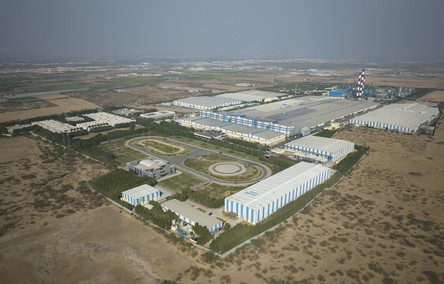In 2015, the renowned tyre manufacturer BKT opened a site in Bhuj, India. The complex, which was then 123 hectares in size, has grown massively since. By the end of the year, the area is to be expanded to a total of 323 hectares. The company needs the additional space for important and forward-looking investments in its production capacities. The manufacturer intends to increase this to 600,000 tonnes annually within three years and also invest in rubber track production. Overall, BKT has grown by almost 50 percent during just the last three years of the pandemic, and was able to achieve a record daily production of 436 tonnes last year in Bhuj alone.
Carbon black from in-house production is picking up speed
Just two years after the site opened, BKT ensured greater independence from the raw materials market in Bhuj with its own production plant for carbon black. From an initial 65,000 tonnes of activated carbon black per year, the company has since increased its production to 165,600 tonnes last year. For the current year, a capacity of just under 200,000 tonnes is being targeted. With this, BKT has long since changed from being a buyer to a significant supplier for industrial carbon black and serves areas of application beyond tyre production, for example with the so-called speciality carbon black.
Sustainable production
BKT has designed the entire carbon black production process to be as sustainable as possible. The transportation of carbon black to own production facilities now takes place using mobile silos, saving 100,000 bulk bags annually. In addition, the entire transport system is designed to reduce energy consumption and CO2 emissions, with the goal of achieving a 70 percent saving, which corresponds to more than two mega tonnes of CO2 annually. At the same time, BKT feeds about 75,000 cubic metres of gas from the carbon black production into a combined heat and power plant. Thus, the tyre manufacturer aims to reduce fossil fuel consumption by up to 215,000 tonnes per year.
Investments in precision and waste prevention
At the moment, more powerful machines are being installed on site, which allow quicker and more precise work and increase not only the output quantity but also the quality of the final product. The aim is also to reduce the amount of waste and thus lower production costs. Since 2019, the entire production facility has been following the ZLD principle. ZLD stands for Zero Liquid Discharge. Practically no drop of industrial waste water leaves the area. Instead, it is processed and fed back into the production process.
BKT takes social responsibility seriously.
The new facilities and extensions are intended, not least, to significantly increase occupational safety and comfort for the nearly 5,000 employees. 1,000 employees already live and work on the central BKT site in Bhuj. This number is expected to increase further by expanding the accommodation facilities. Furthermore, BKT is heavily involved in the areas of health care and education for the workforce and their children.

